- Home
- Raymond Benson
Bond Movies 06 - The World Is Not Enough
Bond Movies 06 - The World Is Not Enough Read online
Ian Fleming's
JAMES BOND
in
The World is not Enough
Raymond Benson
Story by Neil Purvis & Robert Wade
Screenplay by Neil Purvis & Robert Wade and Bruce Feirstein
The author wishes to thank the following individuals for their help in preparing this book
Bruce Feirstein
Peter Lamont
James McMahon
Mona Re Robertson
01 - Errand Boy
As he rode in the taxi from Bilbao’s airport, James Bond’s recollection of M’s orders was clear enough. Bring back Sir Robert's money.
Nevertheless, Bond had a secondary objective in mind, and one that might prove to be slightly more of a risk. Initially, he had bristled at the notion of being a messenger boy for a wealthy oil tycoon, even if the man was a fellow Briton. He had to make sure that Sir Robert received a refund for a bad purchase he had made on the black market. Bond normally considered this kind of assignment a waste of time for someone in the Double-0 Section, but then he thought about how the job presented another, more appealing, opportunity.
Fine, he thought. He would get the money back - that was not a problem. But it was more important to avenge the death of a fellow agent.
0012 had been a recent recruit to SIS, and Bond had barely known him. Yet, when a fellow agent was murdered in the field, the entire Double-0 Section took it personally. It was like losing a member of the family. Even though M had warned Bond that entertaining notions of a vendetta might cloud his judgement on this particular assignment, 007 felt that it was his duty to even the score if he could.
It had begun yesterday with a summons from his chief. Bond had welcomed the interruption from the pile of
intelligence reports he routinely absorbed in between assignments. Hoping that he was to be sent across the world on a potentially interesting case or indeed anything that would get him out of London, Bond had taken the lift to M’s office in the SIS building on the Thames. Miss Moneypenny had offered no hint as to what the assignment was to be, except that she was arranging for him to fly to Spain.
M was busy with a document on her desk when he walked in.
‘Sit down, Double-0 Seven,’ she said without looking up.
Over the past few years Bond had strengthened his relationship with his relatively new boss at SIS. The new M had earned Bond’s respect and loyalty. He liked to think he had earned hers.
However, when she said, ‘Sir Robert King needs an errand boy, and you’re he,’ Bond blinked.
‘Ma’am?’ Bond wasn’t sure that he had heard her correctly. ‘The oil tycoon?'
‘That’s right. He needs you to go to Bilbao tomorrow to pick up a case full of money from a Swiss bank there. It’s a refund for a secret report he bought on the black market. The document wasn’t what he had been led to believe it was. He complained. The sellers agreed to a refund in good faith. An intermediary has requested that MI6 send someone to pick it up. I’d like you to do it, Double-0 Seven.’
Bond frowned. He was not a person who kept up with the lives of Britain’s rich and famous, but he knew enough about Sir Robert King to know that he was certainly high on the list of UK VIPs.
‘Besides,’ M continued, ‘it would be a personal favour for me. Sir Robert is an old friend’
Bond was not surprised. M had friends in powerful places. She had come to SIS well connected and was able to play the politicians with more finesse than her predecessor ever cared to do. Even though she was the head of SIS, M was not averse
to socialising with Britain's elite. In this day and age it was probably wise intelligence policy.
Bond silently reviewed what he knew about the man. Sir Robert King, Chief Executive Officer and Chairman of King Industries Plc., had made a fortune over a quarter of a century ago from a lucrative construction business inherited from his father. When King married his second wife, whose family owned the remnants of a mismanaged oil importing firm, he slowly moved King Industries’ interests toward petroleum production, following the tragic death of his wife, King spent the next ten years saving the company’s assets and tripled his income, as well as Britain’s own oil supplies. He had become a national hero of sorts and had been knighted. Since that time King Industries had become a major player in a worldwide, competitive business. King was always popping up in the British press. Bond’s impression of him was that he was something of a charming rogue who enjoyed the life of a very rich, elderly playboy. Bond had never met the man, nor did he wish to.
And then there was the daughter . . .
‘What ever happened with the Elektra King kidnapping case?’ Bond asked. ‘It isn’t talked about much these days, is it?' M looked at Bond with steel in her eyes. ‘That’s completely irrelevant to your assignment, Double-0 Seven.’
Bond blinked again. Had he touched some kind of nerve? It had happened a little over a year ago. Elektra King, Sir Robert’s glamorous daughter, a girl in her late twenties, had been kidnapped and held for ransom. At the time Bond had been out of the country on assignment. He didn’t know much about the case; only that Miss King had been held for two or three weeks, and then had miraculously escaped on her own. Most of her captors were killed. He remembered that it had been reported in the British press and on the BBC, but the coverage disappeared from the news surprisingly fast considering the victim involved.
‘I like to know all the facts before I walk into something, especially if it happens to be a Swiss bank,’ he said.
M was not amused. ‘MI5 took over the kidnapping case as it occurred in this country. We have never had anything to do with it,’ M said. ‘As for the press, perhaps for once they respected the family’s wishes not to be bothered about a painful and traumatic event. Thank God they left the poor girl alone after her ordeal. But never mind that. We are connected to this report Sir Robert bought. It was one of Double-0 Twelve’s possessions. The report was stolen from his office when he was killed.’
‘Really?’ Bond asked, interested now. News of 0012’s murder in Omsk had sent a shockwave throughout the department. One of the few Double-0 agents who was permanently stationed abroad, 0012 was found shot dead in the Russian station a month ago. The office had been ransacked and all classified material taken.
‘I don't want you to go entertaining notions of a vendetta, Double-0 Seven,’ M warned. ‘It can cloud your judgement. Double-0 Twelve’s murder is being investigated. Your assignment is to bring back Sir Robert’s money.’
With that she had dismissed him. Moneypenny provided him with his ticket, travel details and the contact at the bank, a man named Lachaise. Before leaving the building, Bond visited Q Branch to pick up something he knew might be useful.
He had flown on Iberia Airlines to Bilbao the next morning, and now he was being whisked by taxi into the capital of Vizcaya province in northern Spain. The city’s outskirts, near the airport, were a hub of maritime commerce and heavy industry. Bond was driven to the Casco Viejo, the nerve centre that is bundled up on the right bank of the Ria de Bilbao, where he could see the municipality’s characteristics change to a metropolitan cluster of banks and modem office buildings. During the day the city retained a business-like and somewhat elegant ambience, not unlike that of some French provincial capitals. All that disappeared after sundown, for Bond could attest to the celebrated Spanish love for rowdy night-long revelry in this particular city. He once had a memorable evening (and morning) with a fiery senorita in Bilbao. A flamenco dancer by profession, she had used what he could only best describe as ‘rhythmic charms’ to demonstrate that Latin lovers really are warm-blooded.
&
nbsp; The taxi pulled around Alameda de Mazarredo, where the Museo Guggenheim de Arte Contemporaneo is now the showpiece of the waterfront. Designed by American architect Frank Ghery, one critic has described the spectacular titanium-skinned building as ‘a cauliflower on LSD’. Still, Bond couldn’t help but be impressed with the shimmering, iconoclastic structure, which certainly seemed out of place in a city not known for its love of art. Too bad he hadn’t the time to take a look at the collection, but he wasn’t in Spain for that.
Bond stopped the taxi in the Plaza del Museo, then walked away from the Guggenheim toward a nearby rather nondescript office building. The engraved brass plaque in front announced ‘La Banque Suisse de l’lndustrie (Privee)’. Underneath were translations in Spanish, German and English. Before entering, Bond slipped on the lightly-tinted glasses that he had picked up from Q Branch, then made a quick check of his belongings, namely the Walther PPK under his navy sport jacket and a Sykes-Fairbairn throwing knife concealed in a sheath on his lower back.
He entered the building and gave his name to the mousy, horn-rimmed receptionist. She punched some buttons on her desk and spoke French into her headset. She nodded, then said to Bond, smoothly switching to English, ‘Mister Lachaise will be with you momentarily.’ Bond smiled and sat down in the comfortable lounge. The Guggenheim could be seen in all its splendour across the Plaza through a large wall-sized window.
Three Armani-clad thugs eventually appeared from behind a column. The suits were incongruous, for they looked more like professional wrestlers than bankers.
‘Mister Bond?’ one of them grunted. ‘Come this way’
Bond stood and followed them into the lift. The three men stood silently around him, one man in front, blocking the doors.
‘Nice day,’ Bond said. The men didn’t acknowledge him.
The lift stopped at the top floor. The big men escorted Bond down a hallway, past an attentive secretary, and into a luxurious office, the focal point of which was a large oak desk. Behind the desk were three floor-to-ceiling windows that looked out onto a balcony and the street beyond.
Lachaise, an extremely well-groomed gentleman, was sitting at the desk studying figures on a printout.
‘Mister Bond,’ the head thug announced.
As if on cue, the other two men began to frisk Bond. They quickly found the Walther and set it on the desk. A few seconds later, they found the knife and laid it beside the other things.
The head man nodded to Lachaise that Bond was clean.
When this formality had been completed, Lachaise looked up with patronising amusement and said, ‘Good. Now that we’re all comfortable, why don’t you sit down?’ He gestured to a leather armchair, then sat back behind the desk. ‘So good of you to come to see me, Mister Bond. Particularly at such short notice’
Bond said, ‘If you can’t trust a Swiss banker, what's the world coming to?’
Lachaise laughed gently and punched a button. Bond dropped into the chair as a very attractive brunette entered the room, pushing a cart carrying a large silver metal case and a cigar box. She picked up the box and offered it to Bond. It was full of Havanas. He shook his head, keeping his attention on the banker. She then offered the box to
Lachaise, who took a cigar and set it on the ashtray on the desk.
‘Thank you, Giulietta,’ Lachaise said. He turned his attention to Bond. ‘It wasn’t easy, but I retrieved the money. No doubt Sir Robert will be pleased to see it again.’
The girl picked up the case and set it in Bond’s lap. She opened it with a flourish, a seductive smile on her face during the entire process. The case was full of fifty pound sterling notes.
It s all there at the current exchange rate. Here is the statement.’
Giulietta offered Bond a piece of paper, which he took and gave a cursory glance. It was an odd number, calculated down to the penny: £3,030,003.03.
‘Would you like to check my figures?’ the girl asked. ‘I’m sure they’re perfectly rounded,’ Bond replied. She was certainly not Swiss, Bond observed: she looked Mediterranean, with long, curly hair and large brown eyes. Spanish? Southern Italian, perhaps?
She closed the case and stepped back as Lachaise said, ‘It’s all there; I assure you,’
Bond slipped the statement into his pocket, then slowly and deliberately removed his glasses. He eyed Lachaise and, after a brief pause said, ‘I didn’t come only for the money. The report Sir Robert bought was stolen from an MI6 agent. Who was killed for it.’
Bond reached into another pocket and pulled out a photo of 0012. He laid it on the desk in front of Lachaise.
‘I want to know who killed him.’
Lachaise raised his eyebrows, attempting to register confusion and surprise, as if he had no idea what Bond was talking about. He glanced at the photo. After an obviously rehearsed moment of reflection, Lachaise went, ‘Tsk, tsk,’ nodded his head, and said, ‘Oh, right, quite so. Yes, terrible tragedy.’ Bond looked at him hard, waiting for him to go on.
‘But,’ Lachaise said, raising a finger, ‘not to put too fine a point on it, your MI6 agent had stolen the document himself, two weeks earlier, from a Russian operative.’
As if that excused the killer.
‘I want a name,’ Bond said.
Lachaise smiled much too warmly. ‘Discretion, Mister Bond. I’m a Swiss banker. Surely you can understand my position. . ’ ‘Which is what?' Bond snapped. ‘Neutral? Or just pretending to be?’
‘I am merely a middle man. I’m just doing the honourable thing and returning the money to its rightful owner’
‘And we know how difficult that can be for the Swiss,’ Bond said.
Lachaisc dropped his smile. The two men stared at each other. The cigar gid and the three thugs felt the growing tension in the room.
Finally, the banker said, I'm offering you the opportunity to walk out with the money, Mister Bond’
‘And I'm offering you the opportunity to walk out with your life,’ Bond replied.
‘In your present situation,’ Lachaise said, indicating the three men behind Bond, ‘speaking strictly as a banker, of course, I’d have to say that the numbers are not on your side.’ He nodded to the first thug, who pulled a Browning Hi- Power 9mm handgun from beneath his jacket.
Carefully putting his glasses back on and fingering the frame, Bond said, ‘Perhaps you failed to take into account my hidden assets’
A flicker of doubt passed over Lachaise’s face as Bond’s finger found a tiny protrusion on the arm of his glasses.
A charge inside the grip of the gun on the table flashed loudly and brightly, blinding everyone except Bond. It was a brief effect, just enough to disorient the thugs and give him the opening he needed Bond jumped out of his seat, spear-handed the gunman in the throat and simultaneously grabbed the pistol with his other hand. The Browning discharged a shot, blowing out one of the windows behind the desk, but the gunman flew backwards, unconscious. Without wasting a second, Bond turned and flung his leg up and out, kicking the second henchman in the face. The third man lunged at Bond, but he was too late. Bond spun around, took hold of the man’s shoulders, and used the thug’s own momentum to hurl him up, over the armchair and against a low cupboard. He then leaped over the desk and thrust the borrowed Browning into the hollow of Lachaise’s cheek.
It all happened in six seconds. Lachaise hadn't had time to think.
‘It seems you’ve had a small reversal of fortune,’ Bond said. ‘Give me a name’
Now truly frightened, Lachaise stammered, ‘I ... I can’t tell you . . .’
‘Let’s count to three,’ Bond said. ‘You can do that, can’t you?’ He cocked the gun, the click sending a shiver down the Swiss banker’s spine. ‘One. Two . . ’
‘All right!’ Lachaise cried. ‘All right! But you must protect me!’
Bond said, ‘Fine. Now talk’
But the banker suddenly stiffened, his eyes wide. A knife had been thrown, and it was now protruding grotesquely from the
man’s neck.
Giulictta the cigar girl had acted quickly and professionally. Now she leaped past the desk, through the broken window and out onto the balcony. Bond pushed Lachaise to the floor and ran to the window. He saw that the brunette was swinging on a wire that she must have previously attached to the balcony railing. She sailed smoothly over the side street to another building. She quickly disappeared into the shadows before Bond could fire a shot. Already there were sirens in the distance; the police had no doubt been alerted by the secretary outside the office. He had to move fast.
Bond turned, only to find that the first thug had recovered and was blocking the way, gun in hand. He was about to squeeze the trigger when Bond saw a red dot appear on the man’s chest. Behind him, another window shattered as a bullet zinged through and pierced the henchman’s heart. Bond instinctively ducked behind the desk and peered outside in an attempt to find the source of the shot, but there were too many windows in the building across the street.
He rolled over and up to run for the door, but he could hear voices and the sound of running feet in the hallway. Bond threw the bolt and quickly glanced at the windows again. Why wasn’t the sniper shooting? He looked around the room and noted that the second thug was beginning to stir.
Bond realised that whoever had shot through the window had not been aiming at him. Perhaps the balcony was the safest escape route after all . . .
A breeze blew, fluttering the curtains that had been pulled back and tied with a long piece of decorative rope. Thinking quickly, Bond grabbed the rope, yanked it down and threaded one end under a radiator pipe beneath the shattered window. He then moved to the prone body of the groggy henchman and tied the rope to his legs in a slip knot.
Shouting in Spanish followed a ferocious hammering at the door. The police had arrived.
Bond deftly picked up his Walther PPK and throwing knife and pocketed them, then clutched the handle on the case full of money. He then wrapped the other end of the rope around his arm and eyed the window, ready to make his move.

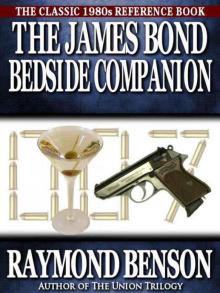 The James Bond Bedside Companion
The James Bond Bedside Companion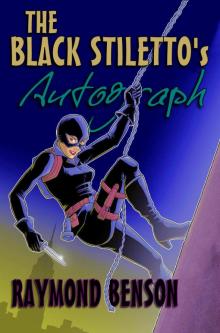 The Black Stiletto's Autograph
The Black Stiletto's Autograph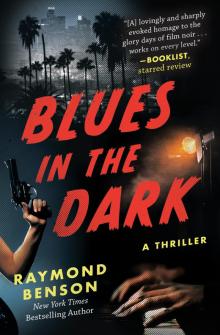 Blues in the Dark
Blues in the Dark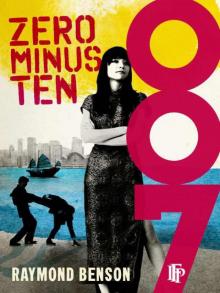 Zero Minus Ten
Zero Minus Ten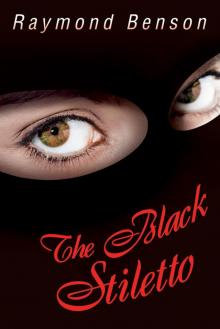 The Black Stiletto
The Black Stiletto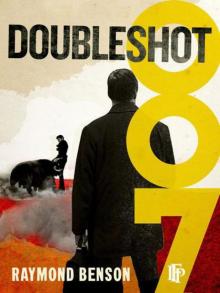 Doubleshot
Doubleshot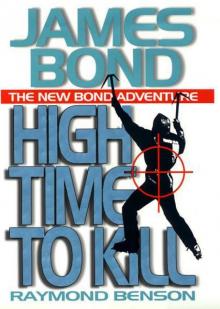 High Time To Kill rbb-3
High Time To Kill rbb-3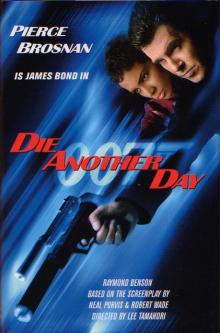 Bond Movies 07 - Die Another Day
Bond Movies 07 - Die Another Day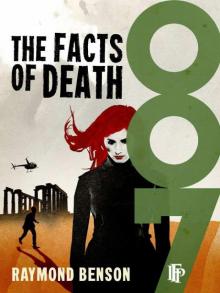 The Facts Of Death
The Facts Of Death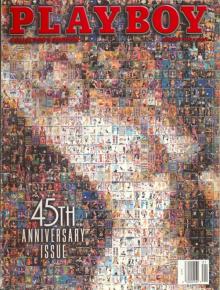 Midsummer Night's Doom
Midsummer Night's Doom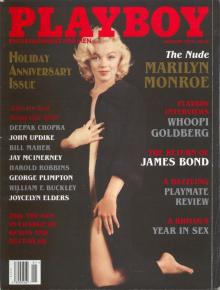 Blast from the Past
Blast from the Past The Secrets on Chicory Lane
The Secrets on Chicory Lane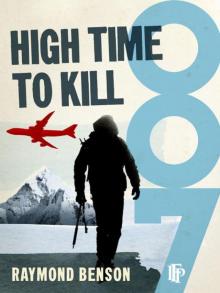 High Time To Kill
High Time To Kill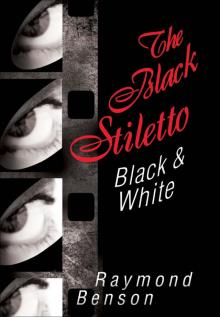 The Black Stiletto: Black & White
The Black Stiletto: Black & White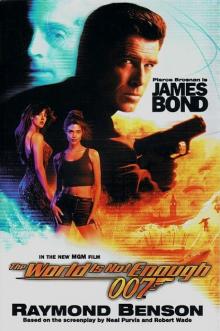 The World Is Not Enough jb-1
The World Is Not Enough jb-1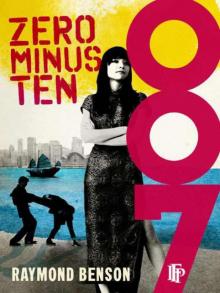 Zero Minus Ten rbb-1
Zero Minus Ten rbb-1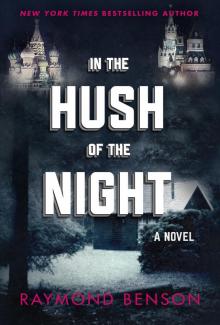 In the Hush of the Night
In the Hush of the Night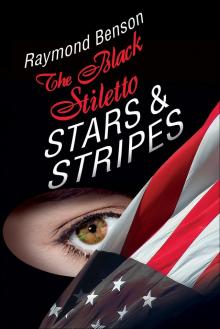 The Black Stiletto: Stars & Stripes
The Black Stiletto: Stars & Stripes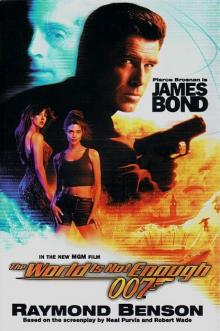 Bond Movies 06 - The World Is Not Enough
Bond Movies 06 - The World Is Not Enough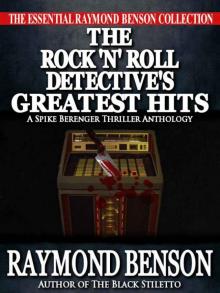 The Rock 'n Roll Detective's Greatest Hits - A Spike Berenger Anthology
The Rock 'n Roll Detective's Greatest Hits - A Spike Berenger Anthology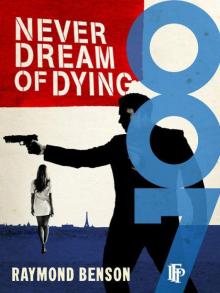 Never Dream Of Dying
Never Dream Of Dying